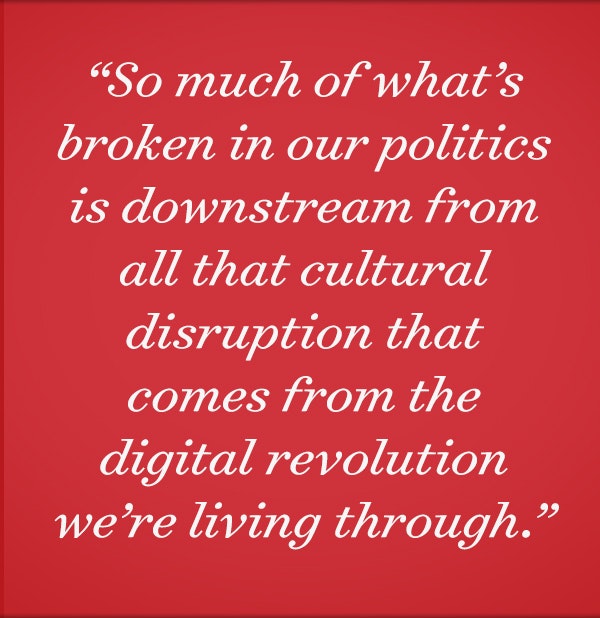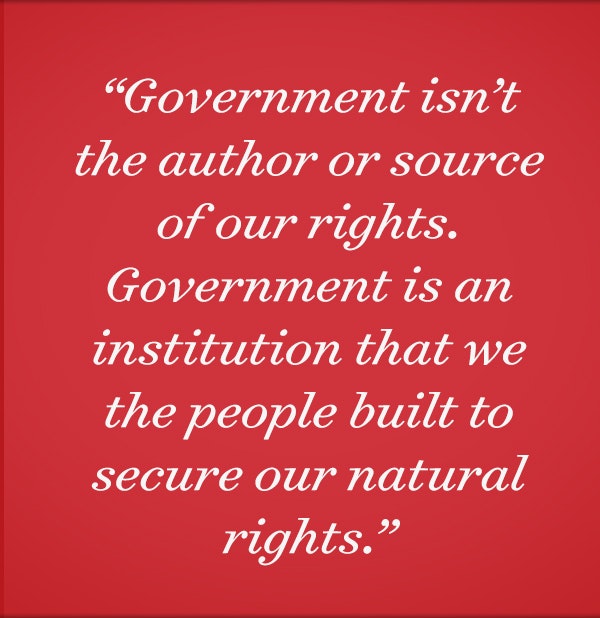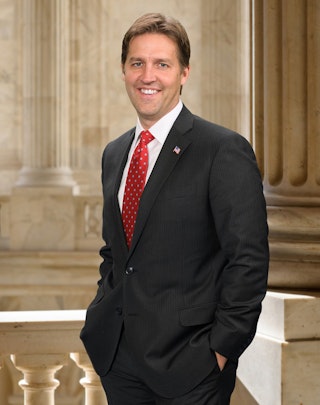Our Politics Should Address the Rebirth of Community
Forces such as the digital revolution will continue to march forward, disrupting community norms and disrupting families. A renewed focus on the local community while ensuring that each generation embraces the American idea can help mend the hollowing of our communities.
 Sen. Ben Sasse, Feb. 26, 2015 (Gage Skidmore/Flickr)
Sen. Ben Sasse, Feb. 26, 2015 (Gage Skidmore/Flickr)
Ben Sasse is a Republican senator from Nebraska and author of The Vanishing American Adult: Our Coming-of-Age Crisis – and How to Rebuild a Culture of Self-Reliance. A Yale-educated historian who previously served as president of Midland University in Fremont, Nebraska, Sasse believes that Americans’ lives are shaped through their communities more than through any Washington policy. But the former management consultant contends that while the global economy is bearing economic fruit, it also is disrupting local communities. In this interview with William McKenzie, editor of The Catalyst, and Lindsay Lloyd, deputy director of the Bush Institute’s Human Freedom Initiative, he explains why communities need to build modern institutions to renew themselves – and why our politics should address this challenge.
You’ve written about the transformation in the way we work, terming it the “largest economic disruption in recorded human history.” How do you see this change affecting local communities? How does it affect life in Nebraska?
When you’re living through a revolution, it’s really hard to see what’s happening. But my suspicion is that a century from now we’ll look back on this moment and see it as significant as industrialization and urbanization.
…a century from now we’ll look back on this moment and see it as significant as industrialization and urbanization.
That’s so not only in the massively increased total output of the economy but also in the disruption of local community. By that, I mean family structures, friendship, neighborhoods, average duration at a job or firm, and a sense of place.
After urbanization and industrialization, despite how radically disruptive that was in the late 19th and early 20th centuries, we ended up forming new kinds of social capital and new ways of relating to each other in cities. That happened chiefly in urban, ethnic neighborhoods that replicated, in many ways, the social capital of historic agricultural communities and small towns. But when that started, no one knew exactly how it was going to settle out and it felt terrible to people.
As you migrated across the Atlantic to U.S. cities, or as you migrated from the farm to the city, there was great despair when people got to cities. Alcoholism was so prevalent that, as bizarre as it seems to us today that Prohibition could have passed, the adoption of that constitutional amendment with overwhelming support shows you how hopeless and alone people were when they got to cities.
Opioids are in our time what alcoholism was in the arrival of new immigrants and internal migrants across the countryside to cities. That’s what you see happening in lots of American communities now. We see rapidly increasing family breakdown.
A new longitudinal study, which has been tracking girls who are now 14 over the course of their lives, shows that 59 percent of American 14-year old girls have lived through massive family disruption. Fifty years ago, out-of-wedlock birth rates were 6 percent overall. In particular communities where they spiked higher, this was seen as a challenge to whether the republic could continue. Today, 59 percent of 14-year old girls have gone through that kind of family disruption.
The average American 25 years ago had just over three friends, defined in an Aristotelian sense as the kind of confidant that you share your biggest hopes, dreams and fears with, to under two friends today. That’s almost a halving of friendship in 25 years.
The average duration of someone working at a firm has gone from two-and-a-half decades in the 1970s to just over four years now. That average duration is just going to get shorter. McKinsey, where I used to work, put out a new study that speculates about half of American workers will be functionally freelancers by probably 2021.
All of that disruption in place leads to great social anxiety. And it leads to great ache and pain for people since we’re meant to be relational, tribal beings. We’re meant to have friends and shared projects. Right now, people don’t have that and so we’re looking for lots of other places to express our dissatisfaction.
All of that disruption in place leads to great social anxiety. And it leads to great ache and pain for people since we’re meant to be relational, tribal beings.
So much of what’s broken in our politics is downstream from all that cultural disruption that comes from the digital revolution we’re living through. By the way, that is not to deny lots of inarguably great things about the digital revolution in terms of its economic implications for people.

How do these changes affect local communities?
Local communities are much hollower than they’ve been before. When families are breaking down, and the average duration at a firm is shorter and when people have fewer friends, there’s much less stickiness to the place.
Some sociologists talk about American workers in three categories: the mobile, the rooted, and the stuck. That’s a way of thinking about how when there’s all kind of opportunity, in a Tom Friedman world-is-flat-kind-of-way, more people can migrate and go get other great opportunities. There’s an assumption that there will be social capital they can plug right back into. That’s not happening. Lots of folks are stuck and they don’t have opportunities.
Then, there are other Americans who seemingly traipse across the landscape. Jobs are often plentiful in places that they land, but community isn’t.
So we have a massive hollowing out of place and of local community. That’s creating deep angst in America.
How can communities best respond to this change? What more could mediating forces like schools, civic organizations, and nonprofits do to address these changes?
I often joke that Alexis de Tocqueville is the great political philosopher of the Rotary. America is functionally a place where we believe deeply in community, we believe deeply in shared projects, but we believe in it in a voluntarist sense.
America is functionally a place where we believe deeply in community, we believe deeply in shared projects, but we believe in it in a voluntarist sense.
So many folks think that government is just another term for those things that we would choose to do together. That is not true. Government is a compulsory institution. Community and all the not-for-profits that you mentioned are the things we choose to do together.
Right now, the Rotary Club is dying in Appalachia and not being reborn in exurbia. There are still Rotary Clubs in small towns and lots of the places that I’m from in Nebraska. And there are Rotary Clubs in certain big cities. But both of those tend to be places that are hollowing out.
Demographically, far fewer people live in small town America. And in places where there is a lot of growth, we are not seeing revitalization of not-for-profits that we’ve seen throughout most of U.S. history.
I’m optimistic that we will see a rebirth of community, we will see new forms of social capital, but we’re not doing a lot of that institution-building. A lot of people are turning to politics, social media, and broadcast media as a way to rage and blame someone else for what is wrong or unsatisfying in their lives.
I’m optimistic that we will see a rebirth of community, we will see new forms of social capital, but we’re not doing a lot of that institution-building.
It would be a lot more useful for us to have a shared understanding of what we’re going through in terms of this disruption of community. This is a largely a downstream effect of an incredibly dynamic economy but is upending so many of the kinds of work that people have historically known.
The idea that dads are going to go to work at GM and stay there for 35 years and get a gold watch and cake and move to Florida, that kind of work force is never coming back again. And we have a lot of people in politics who, instead of thinking about what kinds of new stability and social capital we need to rebuild in our communities, which inevitably are going to be more digital and mobile, are trying to do nostalgic politics of anger. That’s not going to work.
We have a lot of people in politics who, instead of thinking about what kinds of new stability and social capital we need to rebuild in our communities, which inevitably are going to be more digital and mobile, are trying to do nostalgic politics of anger. That’s not going to work.
You mentioned the opioid problem. Nebraska has a problem with that as well as with methamphetamines. We talk a lot about state and local communities as being laboratories of innovation for public policy. Does that hold true for drugs?
Most of the opioid phenomenon is an echo of these other problems. I don’t think that opioids are causal of the problem. They are mostly an effect.
There are all sorts of necessary policy interventions because the opioids that people are getting today are so much more powerful than anything that we’ve seen in the past. There are definitely federal law-enforcement responsibilities.
Even though I’m a zealous federalist that wants to decentralize as much of our problem-solving to state and local communities and to the 50 laboratories of democracy as possible, ultimately most of these drugs are Mexican and Chinese in origin. This is an interstate commerce and a border issue. It is primarily a federal responsibility on the supply side.
On the demand side, I don’t think the government’s going to be able to do very much to help. This is a community issue and we need to see new kinds of coming together at a community level to fight this stuff.
But most of what’s required at the policy level is going to be federal on the supply side.
 A farm in rural Nebraska (via Nebraska Farm Bureau)
A farm in rural Nebraska (via Nebraska Farm Bureau)
In some small towns, an industry like a meat packing plant or a chicken processing plant has been unable to attract American labor so you see immigrant labor coming in. How does that affect communities, including in Nebraska, where roughly 7 percent of Nebraskans are foreign born and another 6 percent have an immigrant parent? Is that a net plus or a net minus for one-industry towns?
You are describing my town. I live in the country outside a 25,000-person agricultural town, and my dad was a football and wrestling coach there when I was a kid. I graduated from the public high school in that town, where both my teenage daughters were born. When I was growing up, the town was almost all German. The big cultural divide in town was German Catholic and German Lutheran.
Today, it’s a bit over 20 percent Hispanic. Unlike Texas, we’re mostly first-generation Hispanic. We don’t have multi-generations yet, so we’re not there on a lot of third-generation migrants.
One of the challenges in a town like ours, where we have long processed pork and just opened a chicken plant that will likely bring a new wave of immigrants, is that assimilation is slower when language barriers are steep. There is plenty of tension in the community because there is not a lot of assimilation. You see this as well in places across the country.
America needs a two-pronged approach. First, we need a much bigger national conversation about what America is as an idea. We are indeed a nation of immigrants but we also are a creedal nation of immigrants. We believe certain things in common about the American idea. Right now, we’re not doing a very good job of passing that along to anybody, regardless of race or origin in the next generation.
We believe certain things in common about the American idea. Right now, we’re not doing a very good job of passing that along to anybody, regardless of race or origin in the next generation.
Polling data on basic civics shows that about a third of our native-born high school kids could not pass the citizenship and naturalization exam. A huge share of American high school kids don’t know that we have three branches of government and couldn’t name them if they knew there were three.
You can’t really understand America if we don’t start by understanding that government is subordinate to what America means. America is a grand anthropological claim about the dignity of 7.5 billion people across the globe, and particularly the 320 million people that live within our borders. We believe that God gives us rights by nature, government isn’t the author or source of our rights. Government is an institution that we the people built to secure our natural rights.

Ultimately, if you understand why we believe in universal dignity, why America has been working out this claim from the Declaration forward, then you start to understand why our government is limited and why we segment power both vertically and horizontally. You also understand federalism and why, at the federal level, we distinguish between legislative, executive, and judicial functions.
We’re not doing any of that well. Basic civics is not being passed on to the next generation. This is something that our founders understood as important. And Ronald Reagan regularly said that you’re only one generation away from the extinction of liberty if you don’t pass on an understanding of the American idea.
We’re not doing that nationally. Locally, this gives people something that they can rally around as you get to know newcomers in your community. Instead of building on the best of national politics and breaking bread with people in your community, so much of local politics often are an echo of the dysfunction of our national politics.
Instead of building on the best of national politics and breaking bread with people in your community, so much of local politics often are an echo of the dysfunction of our national politics.
So, immigration doesn’t play out in a lot of local communities as a celebratory issue, about things that we all believe in common, regardless of our race or national origin. Instead, local politics are an echo of the dysfunction from screaming at the federal level.
The Catalyst believes that ideas matter. We aim to stimulate debate on the most important issues of the day, featuring a range of arguments that are constructive, high-minded, and share our core values of freedom, opportunity, accountability, and compassion. To that end, we seek out ideas that may challenge us, and the authors’ views presented here are their own; The Catalyst does not endorse any particular policy, politician, or party.
-
Previous Article Editor's Note Editor's Note by William McKenzie, Editor of The Catalyst
-
Next Article Younger Community Leaders Create Hope for Our Democracy An Essay by Holly Kuzmich, Executive Director of the George W. Bush Institute and Senior Vice President of the George W. Bush Presidential Center

